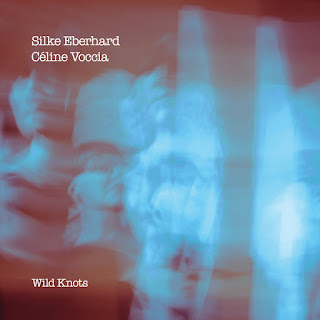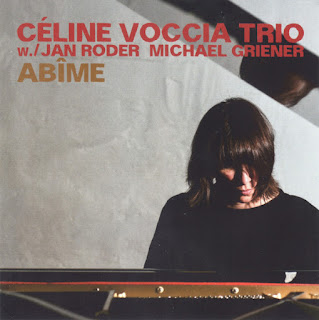couples her classical training with free jazz edge through energetic and
engaging improvisation. In the past half year or so, Voccia’s discography has expanded rewardingly for the free jazz and improvisational music fan. Here are some thoughts on a few recent recording…
Céline Voccia & Silke Eberhard – Wild Knots (Relative Pitch, 2023) *****
Wild Knots, a duo recording from the Voccia and one of Berlin’s leading
saxophonists, Silke Eberhard. Between the two, the comparisons to other musicians
– from Ornette Coleman, Eric Dolphy and Stan Getz to Cecil Taylor
and Olivier Messiaen seem to cover the free jazz and avant-garde
composer spectrum. However, it is no hyperbole, from Eberhard, one hears an unfettered
voice that can be airy and melodic as well as sharp and incisive, and Voccia
is as likely to pluck the strings from inside the piano as she is to lay down
a poignant or unnerving chord fragment.
moments of Eberhardt’s ebullient melodic acrobatics and Voccia’s split second
reactions, the rapport is obvious. The musical conversation ebbs and flows,
their musical ideas so fluid and sympathetic that one could imagine them
just as well reading from a wildly notated composition. The follow up, ‘Indecision,’ begins
with a bit of high register piano work and questioning swirls of notes from
the saxophone. The tune, while never really settling, stabilizes into
minimalist interactions between Voccia extracting
vibrations from within the piano and Eberhard extending her playing to the clicking of her keys and
barely-there notes. As the albums continues it is at turns contemplative
and excited. For example, track five, ‘Renaissance,’ begins austerely with a set of spacious chords and an arc of
notes from the sax, then it catches subtly catches first until it is a blaze of
staccato stabs at the keys and excited melodic snippets, until coming to a sudden
end. The follow-up, ‘Meloncholy,’ has a yearning feel, Voccia’s tonal clusters
are both dissonant and tender, while Eberhard finds a lovely, expressive
elongated tones to match. The final track ‘For Uli’ is a neat summary of all
that has come before, where towards the end the two work up to a pinnacle that
is as fraught with tension as it is energetic.
melodies that could just as well been thoughtfully composed and an overall
inspiring listen.
Céline Voccia Trio – Abîme (Jazzwerkstatt, 2023)
With Berlin mainstays bassist Jan Roder and drummer Michael Griener,
Voccia has found a pair of sympathetic colleagues who are able to
effortlessly support her expansive musical ideas. It is also sort of no
surprise, the versatile bassist and drummer are anchors of the Berlin free
jazz scene, playing with both the legends, including Alexander von
Schlippenbach and the late Ernst Ludwig Petrowsky, as well as current stalwarts
like Silke Eberhard, Rudi Mahall, Axel Dörner, and many more. Voccia fits
right in with playful atonalness, charismatic drive and startling flexibility.
pianist starts with a set of quick melodic snippets while Roder jumps right in
with a solid, supportive line. Griener adds unpredictable – but reliable –
percussive accompaniment. The following ‘Miroirs Envolés’ offers moments of
austere melody and cradling rhythm section work before building to a heart
pounding crescendo. The third track, ‘Lamentations,’ gets exploratory. Bowed
bass, trickling notes from piano, and far away rumbles from the drums,
however, comes quickly together. Swooping bass lines connect with dense chords
and a flowing rhythmic pulse. Greiner added textures provide a little bit of
relief – but not too much – from the tension between the bass and piano. Then, ‘Neant’
begins with a chilling set of chord tones, played sharply and contrastingly
along with plunges into the instrument’s lowest octaves. This thrilling
introduction then gives way to a spattering of percussion and probing bass
work as splashes of notes festoon the sonic space with unusual impact. The
remaining tracks serve as reinforcement of the ideas, adding additional
moments of energetic dissonance and contemplative restraint.
and complex listening, however, it also ‘goes down’ easy. Alto saxophonist
Anna Kaluza’s cool, edgy lines give Voccia a lot to work with and around,
while bassist Matthias Bauer’s big, enveloping sound provides ample support
for sonic exploration.
minutes, each one with its own unique character. ‘Part 1’ begins with a bird
call from Kaluza, followed by Voccia placing some perfectly formed chords in
between the following melodic snippets. Bauer drops some resonant notes as the
track builds up in intensity. Half-way through the five minute track, the approach
has solidified as Kaluza’s packed lines are punctuated with similar bleats to
the opening moments as Voccia and Bauer ratchet up the energy. In ‘Part 2,’
Kaluza is again leading the way with some wide intervallic leaps and extended
melodic ideas, while Bauer is moving quickly over the finger board in an
abstract walk. Voccia’s accompaniment is precise and effective as she and Kaluza thrust and parry.
exploratory nature of ‘Part 3’ is truly beguiling. Bauer draws out harmonics and
textures from his strings and Kaluza is aflutter throughout her instrument’s
range. Voccia seems to not be there at all, until you realize that after the
tinkle of tones at the start of the track, she’s playing the insides of the
piano filling in space with light percussive clatter. Voccia returns in full
on the next track, playing a deliberate and harmonically rich solo
introduction for several minutes before the others jump in.
fantastic work of both group and individual improvisation.




